
llm_finetuning
Large language Model fintuning bloom , opt , gpt, gpt2 ,llama,llama-2,cpmant and so on
Stars: 88
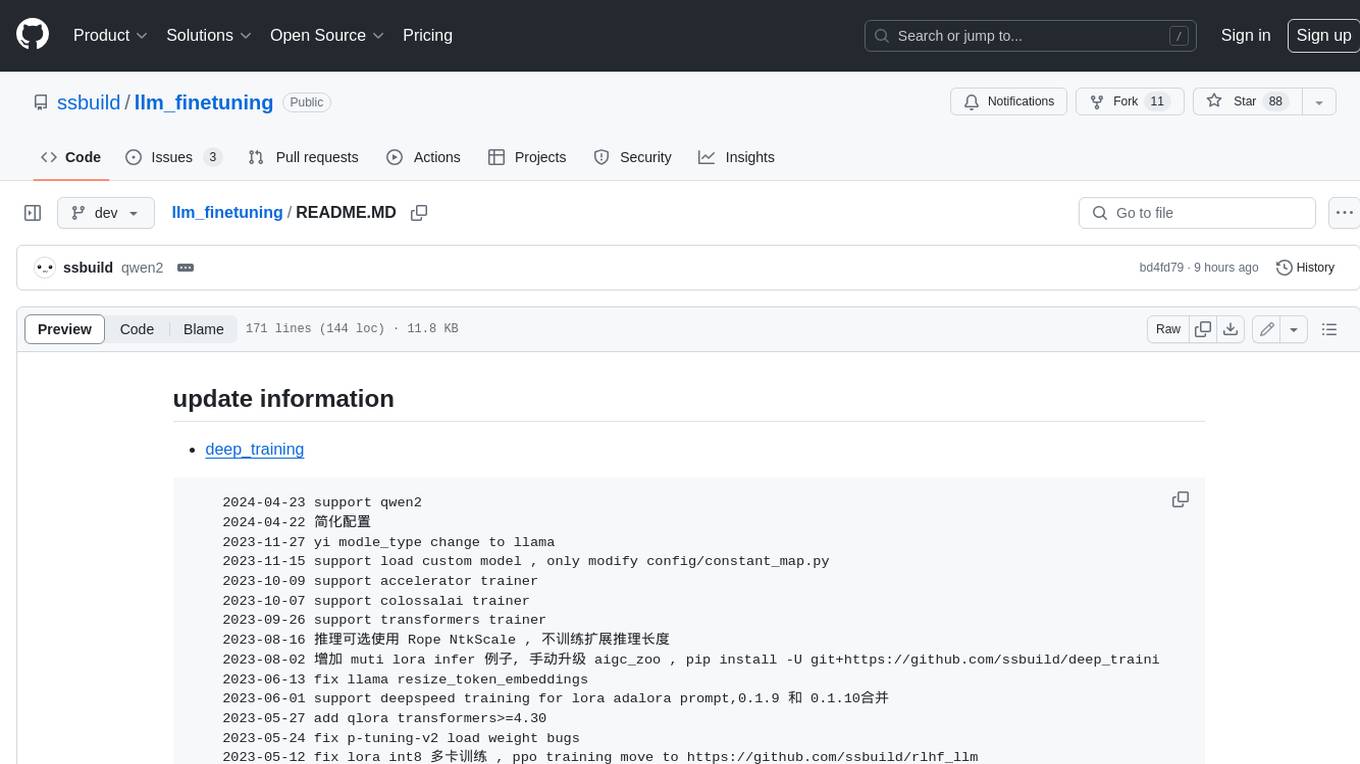
This repository provides a comprehensive set of tools for fine-tuning large language models (LLMs) using various techniques, including full parameter training, LoRA (Low-Rank Adaptation), and P-Tuning V2. It supports a wide range of LLM models, including Qwen, Yi, Llama, and others. The repository includes scripts for data preparation, training, and inference, making it easy for users to fine-tune LLMs for specific tasks. Additionally, it offers a collection of pre-trained models and provides detailed documentation and examples to guide users through the process.
README:
2024-04-23 support qwen2
2024-04-22 简化配置
2023-11-27 yi modle_type change to llama
2023-11-15 support load custom model , only modify config/constant_map.py
2023-10-09 support accelerator trainer
2023-10-07 support colossalai trainer
2023-09-26 support transformers trainer
2023-08-16 推理可选使用 Rope NtkScale , 不训练扩展推理长度
2023-08-02 增加 muti lora infer 例子, 手动升级 aigc_zoo , pip install -U git+https://github.com/ssbuild/deep_training.zoo.git --force-reinstall --no-deps
2023-06-13 fix llama resize_token_embeddings
2023-06-01 support deepspeed training for lora adalora prompt,0.1.9 和 0.1.10合并
2023-05-27 add qlora transformers>=4.30
2023-05-24 fix p-tuning-v2 load weight bugs
2023-05-12 fix lora int8 多卡训练 , ppo training move to https://github.com/ssbuild/rlhf_llm
2023-05-02 增加p-tuning-v2
2023-04-28 deep_training 0.1.3 pytorch-lightning 改名 ligntning ,旧版本 deep_training <= 0.1.2
2023-04-23 增加lora merge权重(修改infer_lora_finetuning.py enable_merge_weight 选项)
2023-04-11 升级 lora , 增加adalora
- pip install -U -r requirements.txt
- 如果无法安装, 可以切换官方源 pip install -i https://pypi.org/simple -U -r requirements.txt
# flash-attention对显卡算例要求算力7.5 以上 , 下面可选安装 ,如果卡不支持可以不安装。
git clone -b https://github.com/Dao-AILab/flash-attention
cd flash-attention && pip install .
pip install csrc/layer_norm
pip install csrc/rotary
支持且不限于以下权重
- Qwen1.5-1.8B-Chat
- Qwen1.5-7B-Chat
- Qwen1.5-14B-Chat
- Qwen1.5-32B-Chat
- zephyr-7b-beta
- mistral-7b-sft-beta
- Yi-6B
- Yi-6B-200K
- Yi-34B
- Yi-34B-200K
- Yi-34B-Chat
- LingoWhale-8B
- CausalLM-14B
- CausalLM-7B
- BlueLM-7B-Chat
- BlueLM-7B-Chat-32K
- BlueLM-7B-Base
- BlueLM-7B-Base-32K
- XVERSE-13B-Chat
- xverse-13b-chat-int4
- XVERSE-13B
- xverse-13b-int4
- Skywork-13B-base
- internlm-chat-20b
- internlm-20b
- internlm-chat-7b
- internlm-chat-7b-8k
- internlm-7b
- internlm-chat-7b-int4
- bloom预训练模型
- bloom第三方中文训练模型 # 注意 需要修改tokenizer_config.json BloomTokenizer -> BloomTokenizerFast
- tigerbot
- opt预训练模型
- llama 官方权重转换 # llama 词典等下载地址 https://huggingface.co/hf-internal-testing/llama-tokenizer
- llama vicuna-7B第三方权重1
- llama vicuna-7B第三方权重2
- cpm-ant-10b
- rwkv 需要转换权重
- rwkv hf 权重
- Llama2-Chinese-7b-Chat
- Llama2-Chinese-13b-Chat
- TransGPT Llama2中文权重
- tigerbot-13b-chat Llama2中文权重
单条数据示例
role one of user system function assistant
q question optional
a answer must
{"id": 1, "paragraph": [{"q": "从南京到上海的路线", "a": ["你好,南京到上海的路线如下:", "1. 南京到上海,可以乘坐南京地铁1号线,在南京站乘坐轨道交通1号线。", "2. 南京到浦东机场,可以搭乘上海地铁1号,在陆家嘴站乘坐地铁1线,在浦东国际机场站乘坐机场快线,前往上海浦东国际机场。", "3. 上海到南京,可以换乘上海地铁2号线,从南京站换乘地铁2线,再从南京南站换乘地铁1路,然后到达上海站"]}]}
{"id": 2, "paragraph": [{"q": "写一个诗歌,关于冬天", "a": ["冬夜寂静冷,", "云在天边飘,", "冰封白雪上, ", "寒冷像一场雪。", " ", "雪花融化成冰,", "像那雪花飘洒,", "在寒冷的冬天,", "感受春天的喜悦。", " 冬日里,", "风雪渐消,", "一片寂静,", "把快乐和温暖带回家。"]}]}
{"id": 3, "paragraph": [{"q": "晚上睡不着应该怎么办", "a": ["晚上睡不着可能会让你感到焦虑或不舒服,但以下是一些可以帮助你入睡的方法:", "", "1. 制定规律的睡眠时间表:保持规律的睡眠时间表可以帮助你建立健康的睡眠习惯,使你更容易入睡。尽量在每天的相同时间上床,并在同一时间起床。", "2. 创造一个舒适的睡眠环境:确保睡眠环境舒适,安静,黑暗且温度适宜。可以使用舒适的床上用品,并保持房间通风。", "3. 放松身心:在睡前做些放松的活动,例如泡个热水澡,听些轻柔的音乐,阅读一些有趣的书籍等,有助于缓解紧张和焦虑,使你更容易入睡。", "4. 避免饮用含有咖啡因的饮料:咖啡因是一种刺激性物质,会影响你的睡眠质量。尽量避免在睡前饮用含有咖啡因的饮料,例如咖啡,茶和可乐。", "5. 避免在床上做与睡眠无关的事情:在床上做些与睡眠无关的事情,例如看电影,玩游戏或工作等,可能会干扰你的睡眠。", "6. 尝试呼吸技巧:深呼吸是一种放松技巧,可以帮助你缓解紧张和焦虑,使你更容易入睡。试着慢慢吸气,保持几秒钟,然后缓慢呼气。", "", "如果这些方法无法帮助你入睡,你可以考虑咨询医生或睡眠专家,寻求进一步的建议。"]}]}或者
{"id": 1, "conversations": [{"from": "user", "value": "从南京到上海的路线"}, {"from": "assistant", "value": ["你好,南京到上海的路线如下:", "1. 南京到上海,可以乘坐南京地铁1号线,在南京站乘坐轨道交通1号线。", "2. 南京到浦东机场,可以搭乘上海地铁1号,在陆家嘴站乘坐地铁1线,在浦东国际机场站乘坐机场快线,前往上海浦东国际机场。", "3. 上海到南京,可以换乘上海地铁2号线,从南京站换乘地铁2线,再从南京南站换乘地铁1路,然后到达上海站"]}]}
{"id": 2, "conversations": [{"from": "user", "value": "写一个诗歌,关于冬天"}, {"from": "assistant", "value": ["冬夜寂静冷,", "云在天边飘,", "冰封白雪上, ", "寒冷像一场雪。", " ", "雪花融化成冰,", "像那雪花飘洒,", "在寒冷的冬天,", "感受春天的喜悦。", " 冬日里,", "风雪渐消,", "一片寂静,", "把快乐和温暖带回家。"]}]}
{"id": 3, "conversations": [{"from": "user", "value": "晚上睡不着应该怎么办"}, {"from": "assistant", "value": ["晚上睡不着可能会让你感到焦虑或不舒服,但以下是一些可以帮助你入睡的方法:", "", "1. 制定规律的睡眠时间表:保持规律的睡眠时间表可以帮助你建立健康的睡眠习惯,使你更容易入睡。尽量在每天的相同时间上床,并在同一时间起床。", "2. 创造一个舒适的睡眠环境:确保睡眠环境舒适,安静,黑暗且温度适宜。可以使用舒适的床上用品,并保持房间通风。", "3. 放松身心:在睡前做些放松的活动,例如泡个热水澡,听些轻柔的音乐,阅读一些有趣的书籍等,有助于缓解紧张和焦虑,使你更容易入睡。", "4. 避免饮用含有咖啡因的饮料:咖啡因是一种刺激性物质,会影响你的睡眠质量。尽量避免在睡前饮用含有咖啡因的饮料,例如咖啡,茶和可乐。", "5. 避免在床上做与睡眠无关的事情:在床上做些与睡眠无关的事情,例如看电影,玩游戏或工作等,可能会干扰你的睡眠。", "6. 尝试呼吸技巧:深呼吸是一种放松技巧,可以帮助你缓解紧张和焦虑,使你更容易入睡。试着慢慢吸气,保持几秒钟,然后缓慢呼气。", "", "如果这些方法无法帮助你入睡,你可以考虑咨询医生或睡眠专家,寻求进一步的建议。"]}]}# infer_finetuning.py 推理微调模型
# infer_lora_finetuning.py 推理微调模型
# infer_ptuning.py 推理p-tuning-v2微调模型
python infer_finetuning.py
# 制作数据
cd scripts
bash train_full.sh -m dataset
or
bash train_lora.sh -m dataset
or
bash train_ptv2.sh -m dataset
注: num_process_worker 为多进程制作数据 , 如果数据量较大 , 适当调大至cpu数量
dataHelper.make_dataset_with_args(data_args.train_file,mixed_data=False, shuffle=True,mode='train',num_process_worker=0)
# 全参数训练
bash train_full.sh -m train
# lora adalora ia3
bash train_lora.sh -m train
# ptv2
bash train_ptv2.sh -m train
- pytorch-task-example
- moss_finetuning
- chatglm_finetuning
- chatglm2_finetuning
- chatglm3_finetuning
- t5_finetuning
- llm_finetuning
- llm_rlhf
- chatglm_rlhf
- t5_rlhf
- rwkv_finetuning
- baichuan_finetuning
- xverse_finetuning
- internlm_finetuning
- qwen_finetuning
- skywork_finetuning
- bluelm_finetuning
- yi_finetuning
纯粹而干净的代码
For Tasks:
Click tags to check more tools for each tasksFor Jobs:
Alternative AI tools for llm_finetuning
Similar Open Source Tools

llm_finetuning
This repository provides a comprehensive set of tools for fine-tuning large language models (LLMs) using various techniques, including full parameter training, LoRA (Low-Rank Adaptation), and P-Tuning V2. It supports a wide range of LLM models, including Qwen, Yi, Llama, and others. The repository includes scripts for data preparation, training, and inference, making it easy for users to fine-tune LLMs for specific tasks. Additionally, it offers a collection of pre-trained models and provides detailed documentation and examples to guide users through the process.
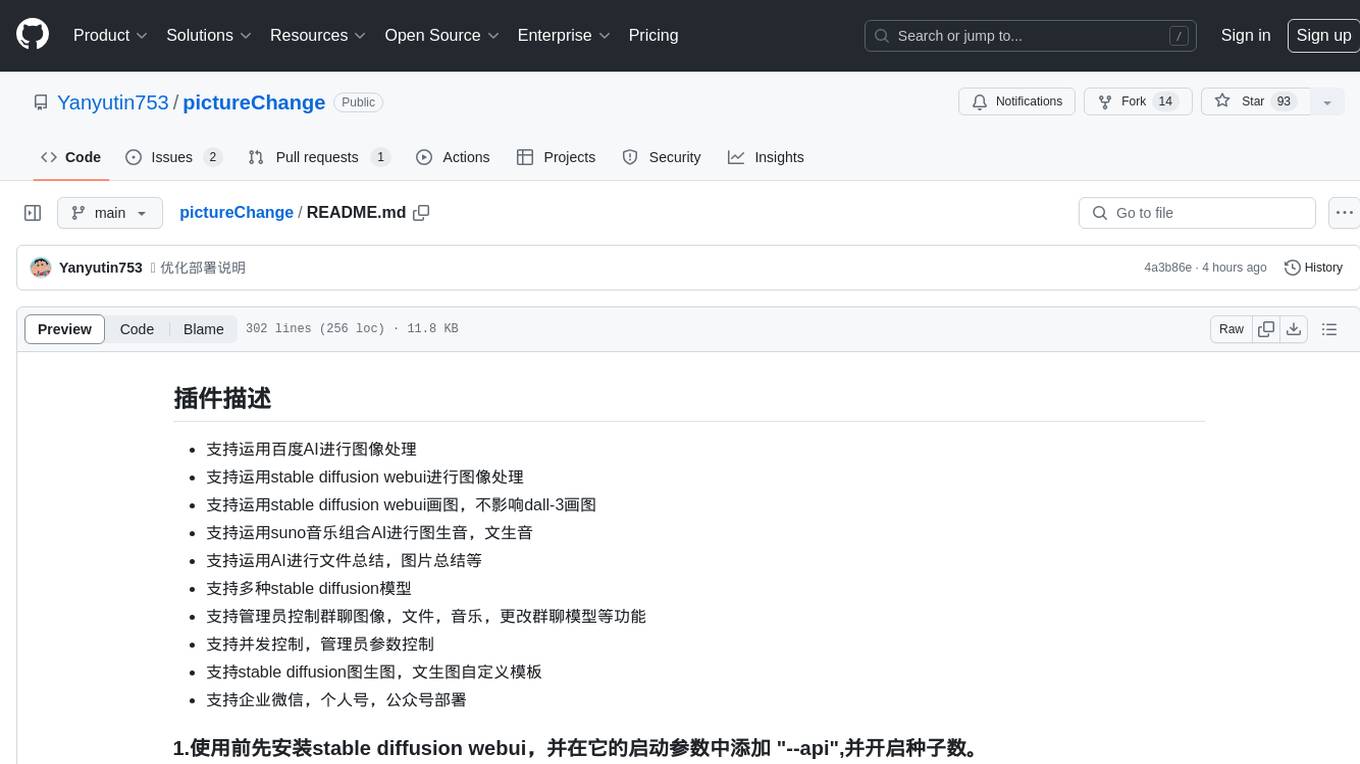
pictureChange
The 'pictureChange' repository is a plugin that supports image processing using Baidu AI, stable diffusion webui, and suno music composition AI. It also allows for file summarization and image summarization using AI. The plugin supports various stable diffusion models, administrator control over group chat features, concurrent control, and custom templates for image and text generation. It can be deployed on WeChat enterprise accounts, personal accounts, and public accounts.
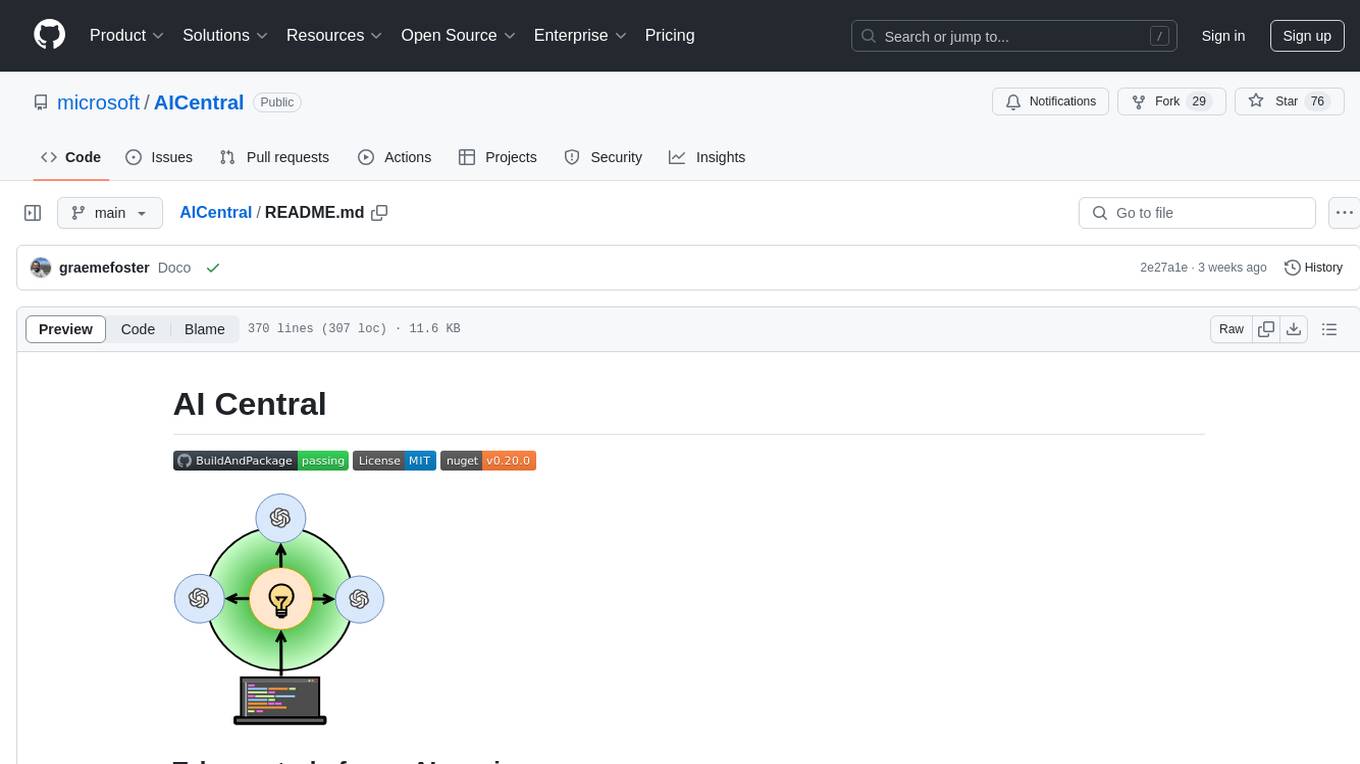
AICentral
AI Central is a powerful tool designed to take control of your AI services with minimal overhead. It is built on Asp.Net Core and dotnet 8, offering fast web-server performance. The tool enables advanced Azure APIm scenarios, PII stripping logging to Cosmos DB, token metrics through Open Telemetry, and intelligent routing features. AI Central supports various endpoint selection strategies, proxying asynchronous requests, custom OAuth2 authorization, circuit breakers, rate limiting, and extensibility through plugins. It provides an extensibility model for easy plugin development and offers enriched telemetry and logging capabilities for monitoring and insights.
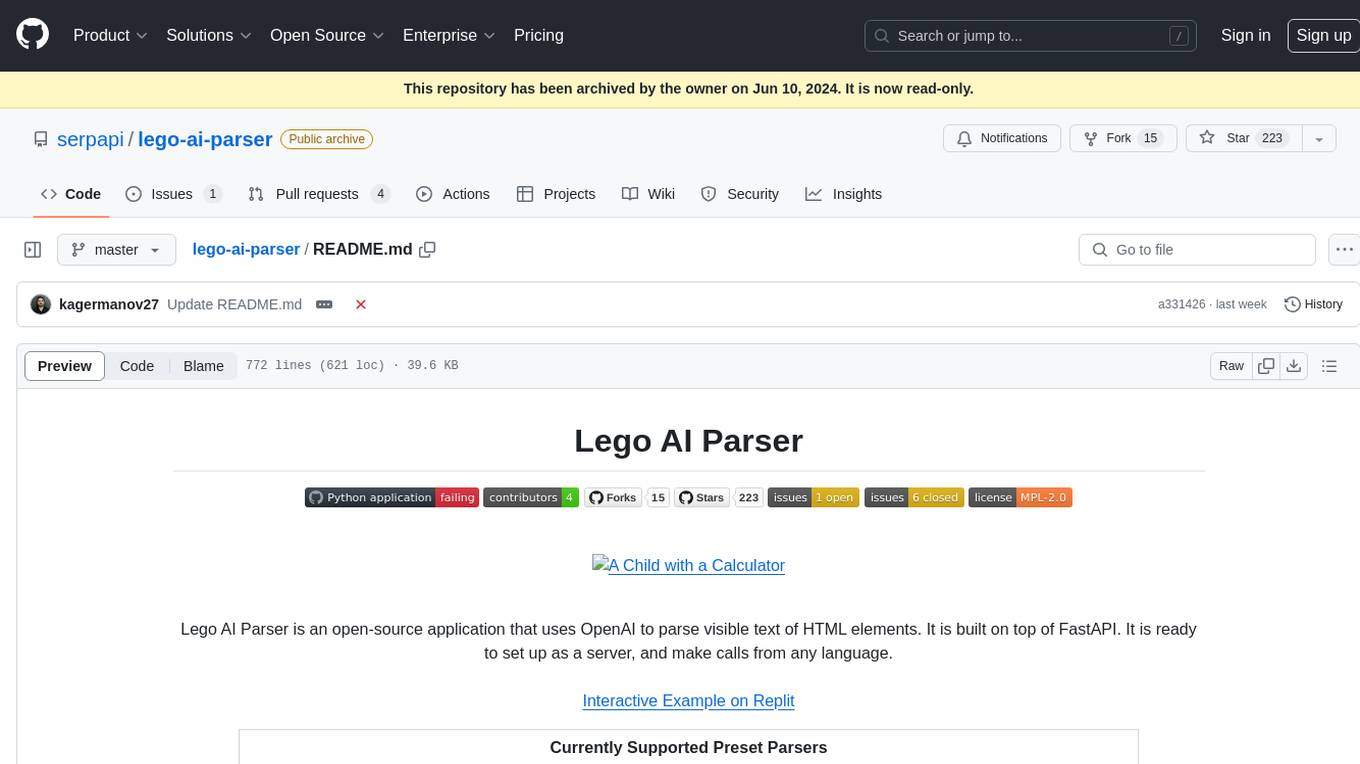
lego-ai-parser
Lego AI Parser is an open-source application that uses OpenAI to parse visible text of HTML elements. It is built on top of FastAPI, ready to set up as a server, and make calls from any language. It supports preset parsers for Google Local Results, Amazon Listings, Etsy Listings, Wayfair Listings, BestBuy Listings, Costco Listings, Macy's Listings, and Nordstrom Listings. Users can also design custom parsers by providing prompts, examples, and details about the OpenAI model under the classifier key.
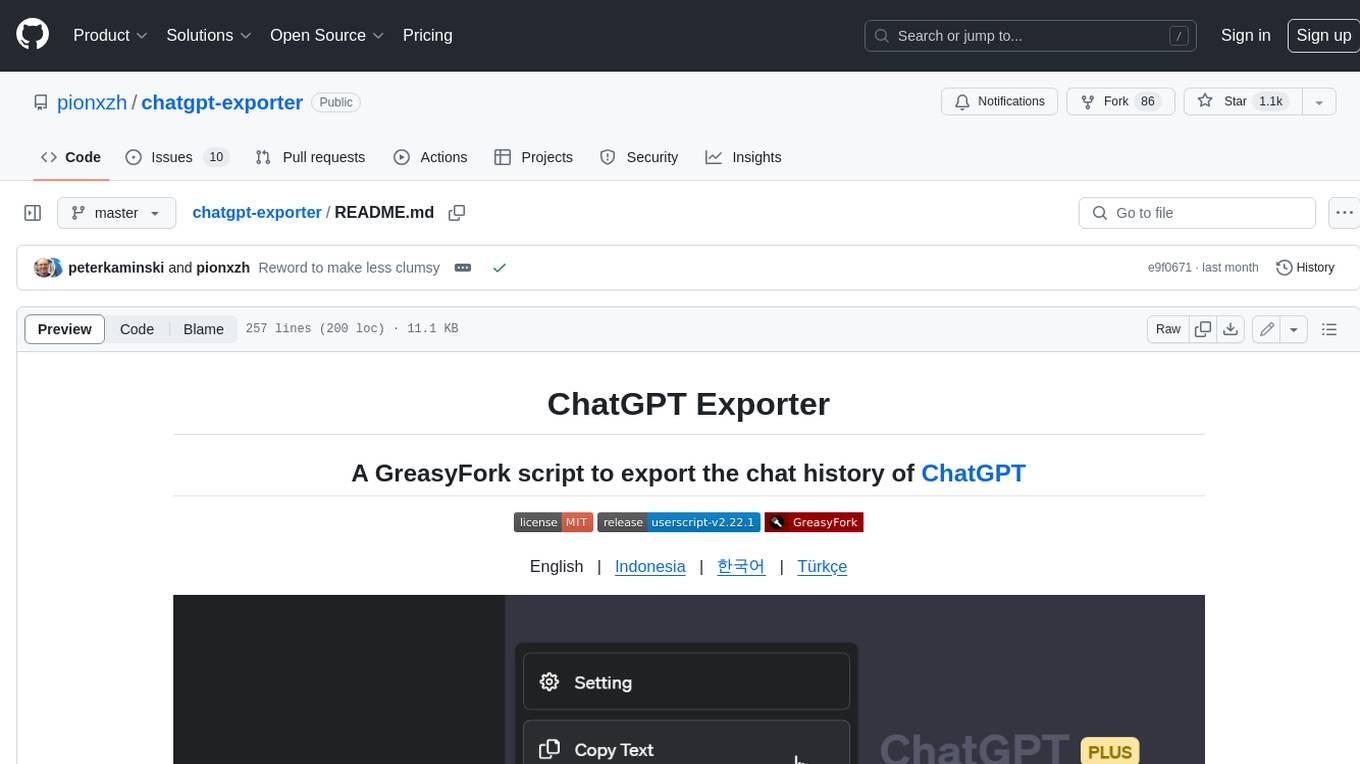
chatgpt-exporter
A script to export the chat history of ChatGPT. Supports exporting to text, HTML, Markdown, PNG, and JSON formats. Also allows for exporting multiple conversations at once.
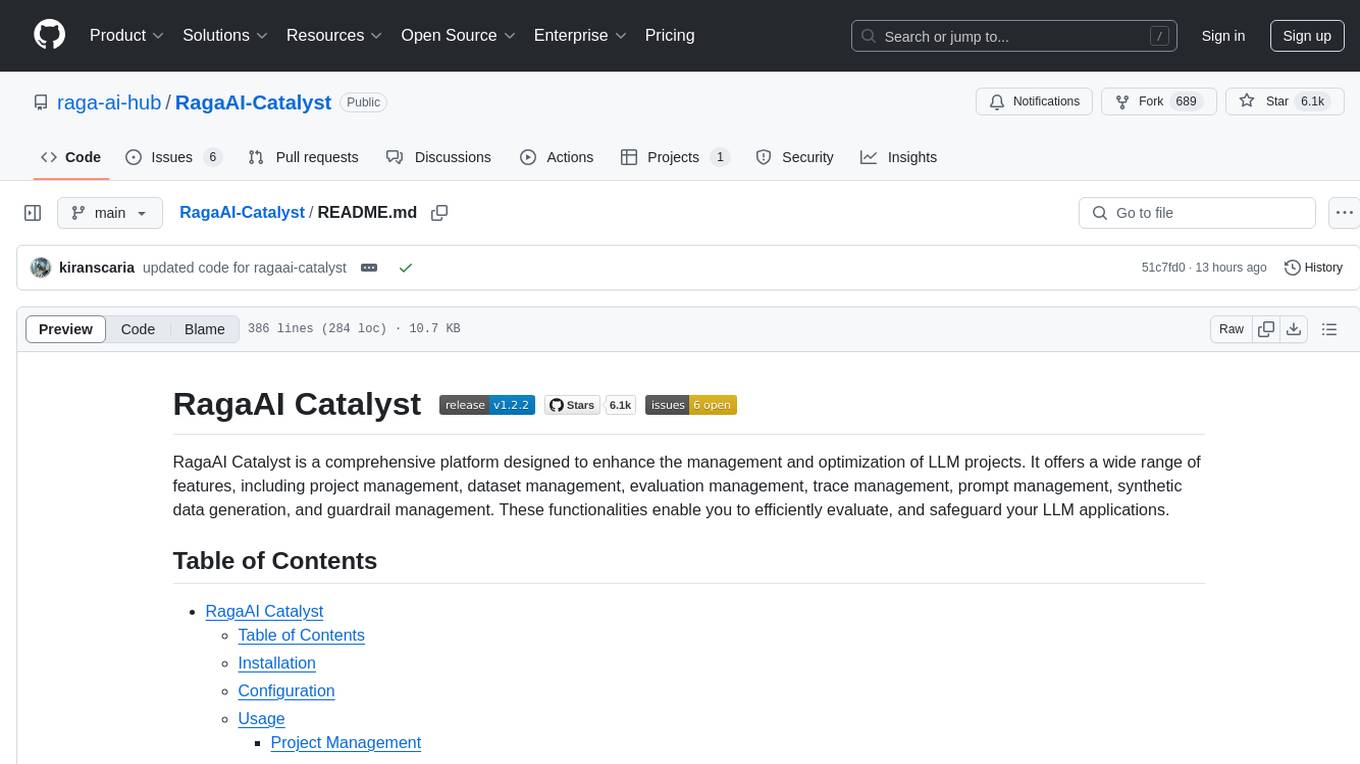
RagaAI-Catalyst
RagaAI Catalyst is a comprehensive platform designed to enhance the management and optimization of LLM projects. It offers features such as project management, dataset management, evaluation management, trace management, prompt management, synthetic data generation, and guardrail management. These functionalities enable efficient evaluation and safeguarding of LLM applications.
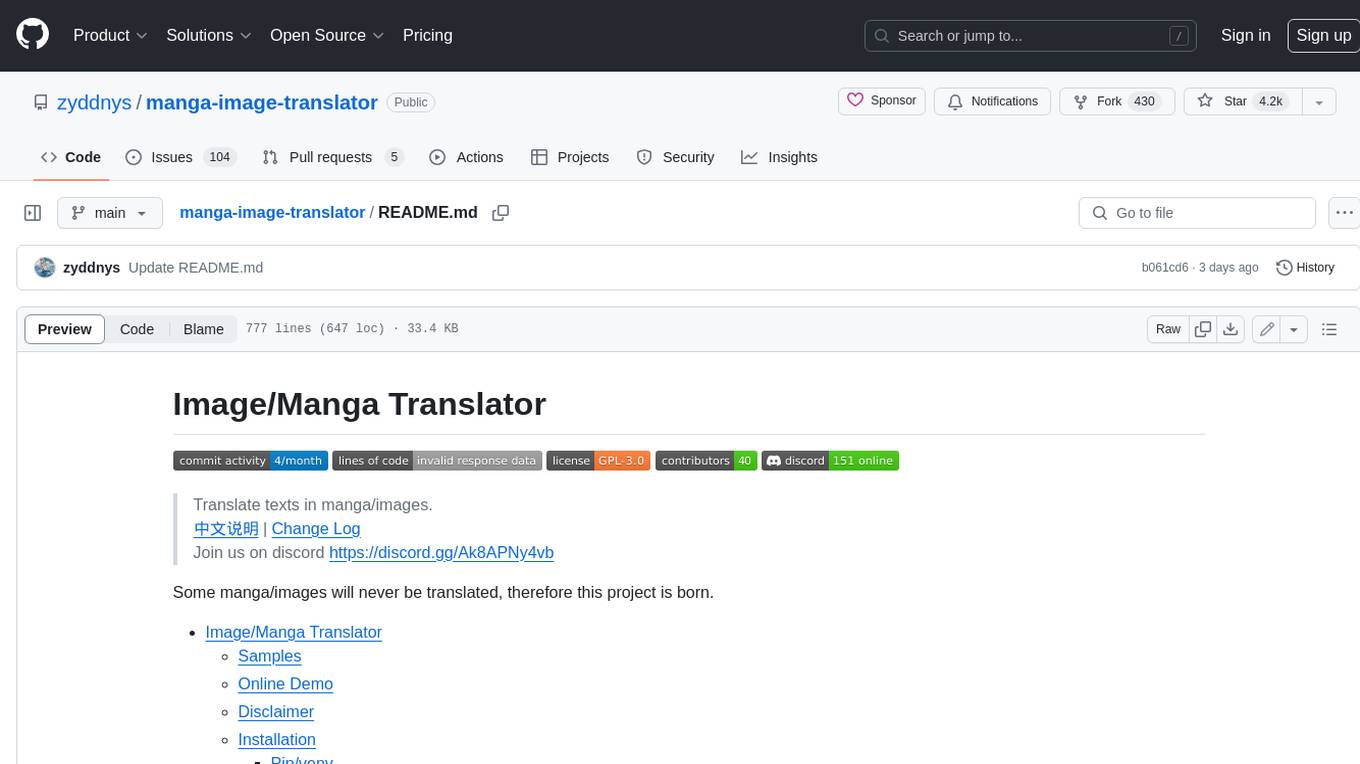
manga-image-translator
Translate texts in manga/images. Some manga/images will never be translated, therefore this project is born. * Image/Manga Translator * Samples * Online Demo * Disclaimer * Installation * Pip/venv * Poetry * Additional instructions for **Windows** * Docker * Hosting the web server * Using as CLI * Setting Translation Secrets * Using with Nvidia GPU * Building locally * Usage * Batch mode (default) * Demo mode * Web Mode * Api Mode * Related Projects * Docs * Recommended Modules * Tips to improve translation quality * Options * Language Code Reference * Translators Reference * GPT Config Reference * Using Gimp for rendering * Api Documentation * Synchronous mode * Asynchronous mode * Manual translation * Next steps * Support Us * Thanks To All Our Contributors :
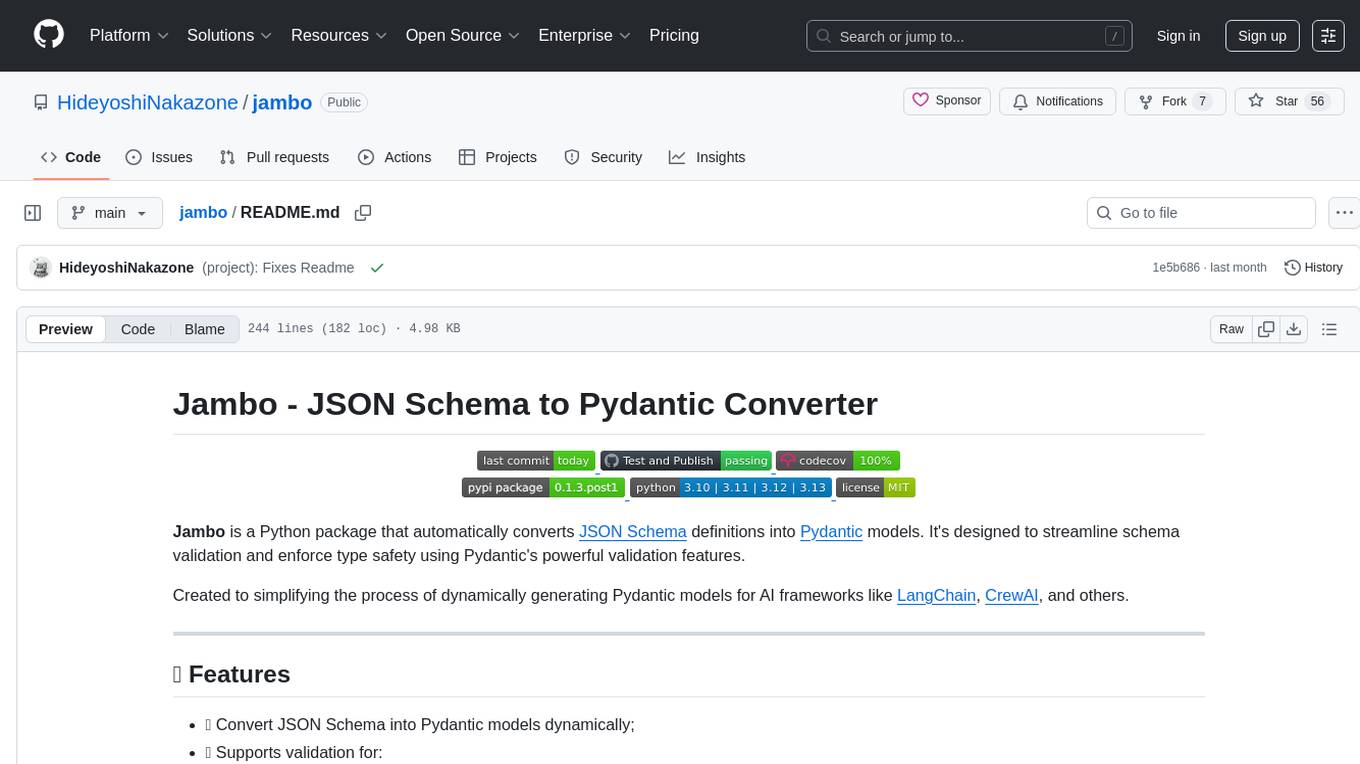
jambo
Jambo is a Python package that automatically converts JSON Schema definitions into Pydantic models. It streamlines schema validation and enforces type safety using Pydantic's validation features. The tool supports various JSON Schema features like strings, integers, floats, booleans, arrays, nested objects, and more. It enforces constraints such as minLength, maxLength, pattern, minimum, maximum, uniqueItems, and provides a zero-config approach for generating models. Jambo is designed to simplify the process of dynamically generating Pydantic models for AI frameworks.
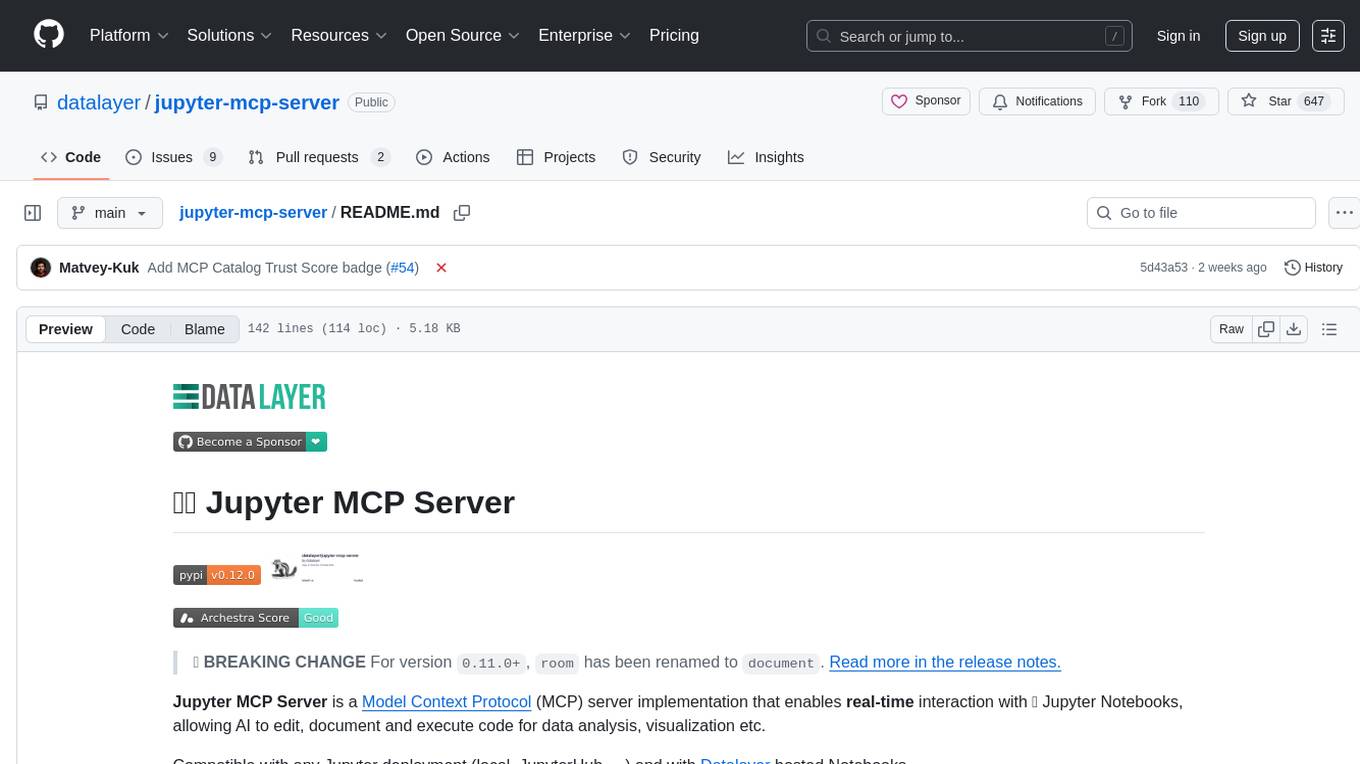
jupyter-mcp-server
Jupyter MCP Server is a Model Context Protocol (MCP) server implementation that enables real-time interaction with Jupyter Notebooks. It allows AI to edit, document, and execute code for data analysis and visualization. The server offers features like real-time control, smart execution, and MCP compatibility. Users can use tools such as insert_execute_code_cell, append_markdown_cell, get_notebook_info, and read_cell for advanced interactions with Jupyter notebooks.
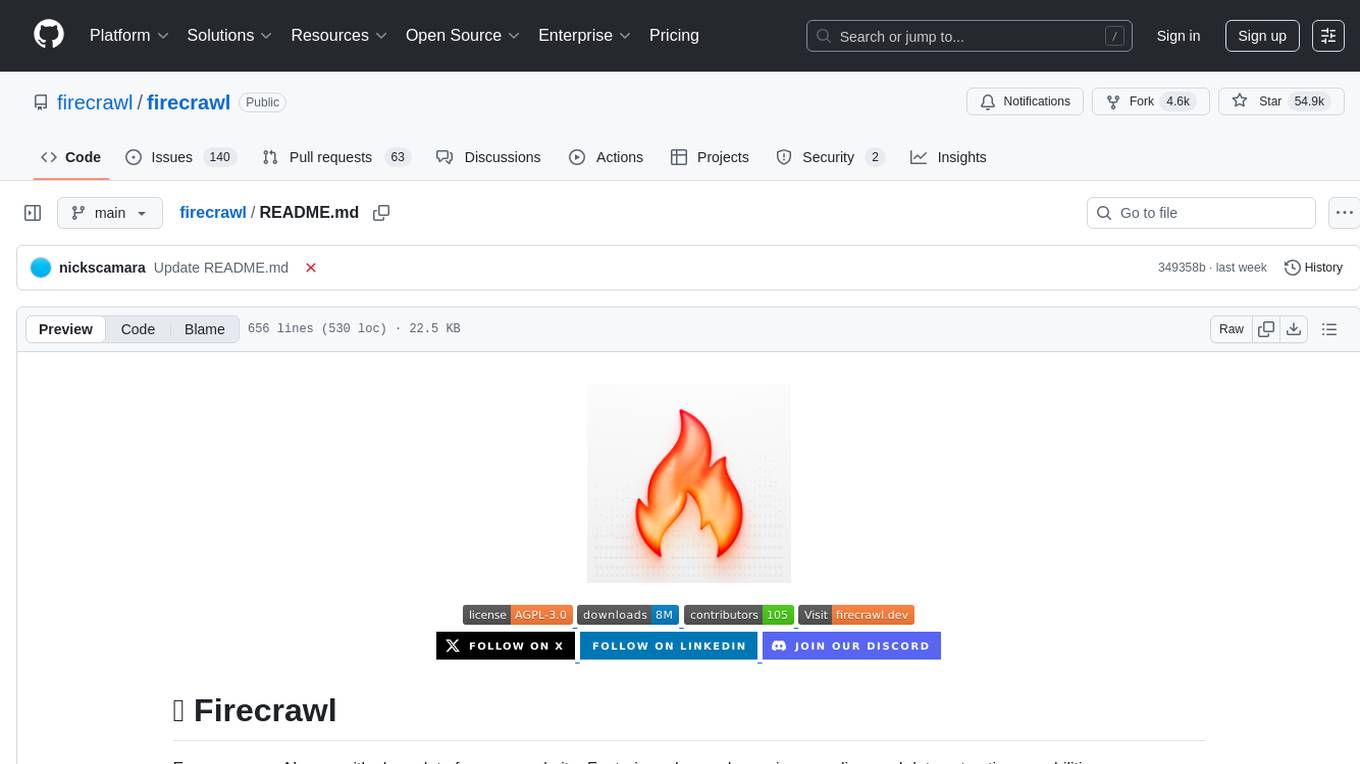
firecrawl
Firecrawl is an API service that empowers AI applications with clean data from any website. It features advanced scraping, crawling, and data extraction capabilities. The repository is still in development, integrating custom modules into the mono repo. Users can run it locally but it's not fully ready for self-hosted deployment yet. Firecrawl offers powerful capabilities like scraping, crawling, mapping, searching, and extracting structured data from single pages, multiple pages, or entire websites with AI. It supports various formats, actions, and batch scraping. The tool is designed to handle proxies, anti-bot mechanisms, dynamic content, media parsing, change tracking, and more. Firecrawl is available as an open-source project under the AGPL-3.0 license, with additional features offered in the cloud version.
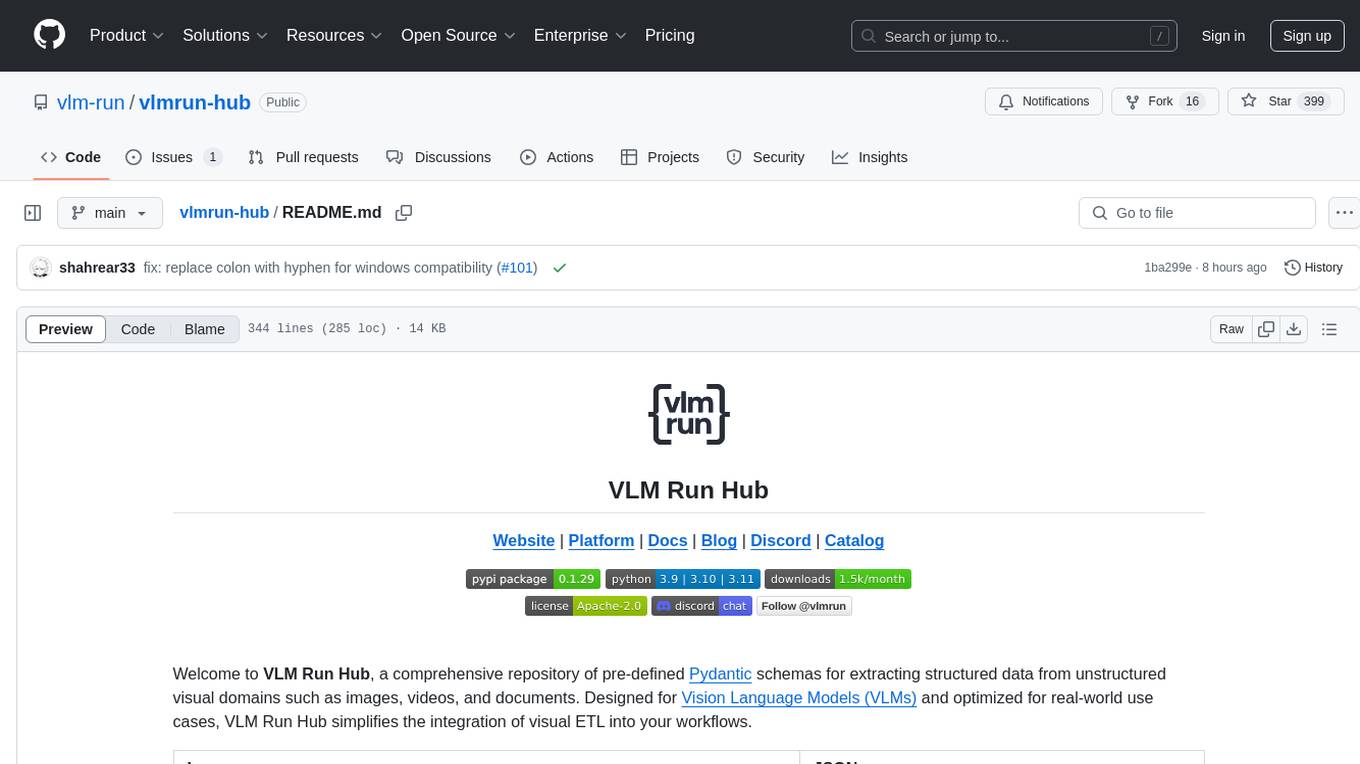
vlmrun-hub
VLMRun Hub is a versatile tool for managing and running virtual machines in a centralized manner. It provides a user-friendly interface to easily create, start, stop, and monitor virtual machines across multiple hosts. With VLMRun Hub, users can efficiently manage their virtualized environments and streamline their workflow. The tool offers flexibility and scalability, making it suitable for both small-scale personal projects and large-scale enterprise deployments.
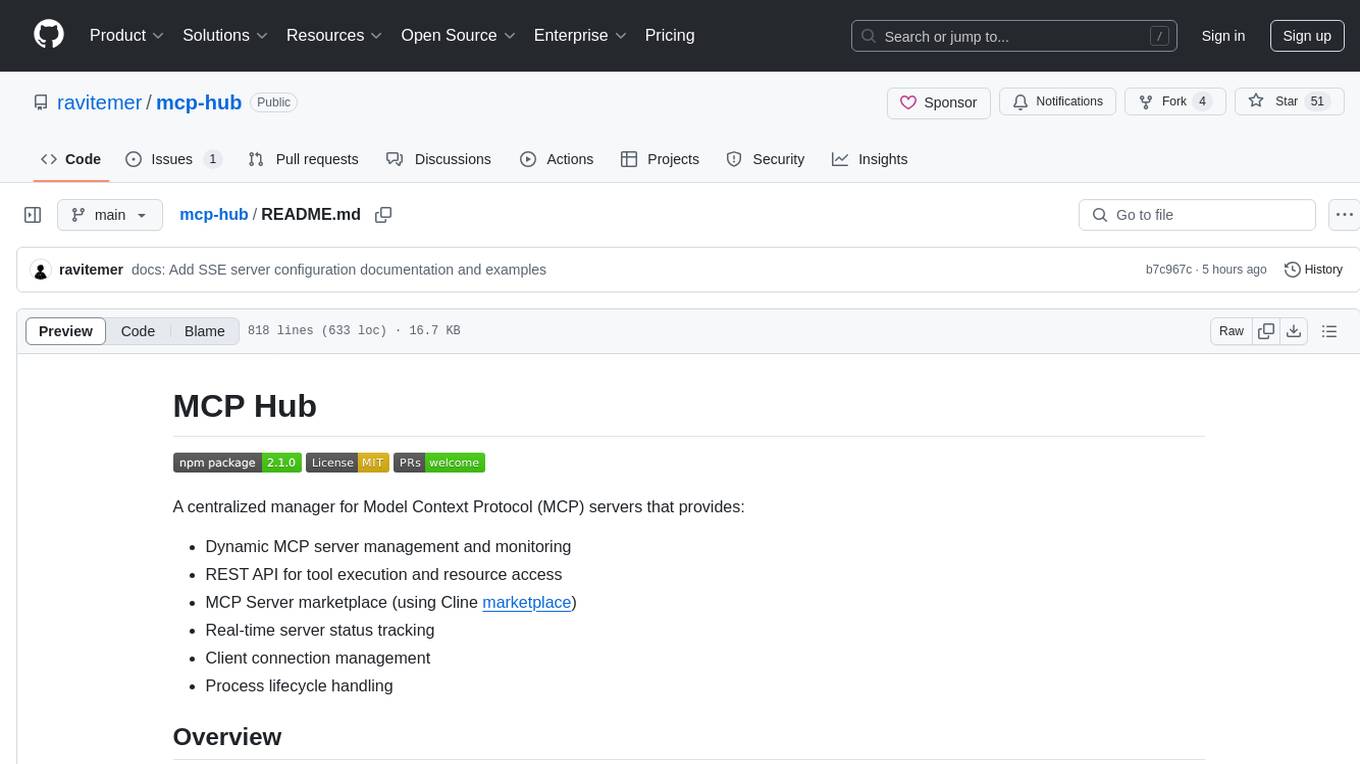
mcp-hub
MCP Hub is a centralized manager for Model Context Protocol (MCP) servers, offering dynamic server management and monitoring, REST API for tool execution and resource access, MCP Server marketplace integration, real-time server status tracking, client connection management, and process lifecycle handling. It acts as a central management server connecting to and managing multiple MCP servers, providing unified API endpoints for client access, handling server lifecycle and health monitoring, and routing requests between clients and MCP servers.
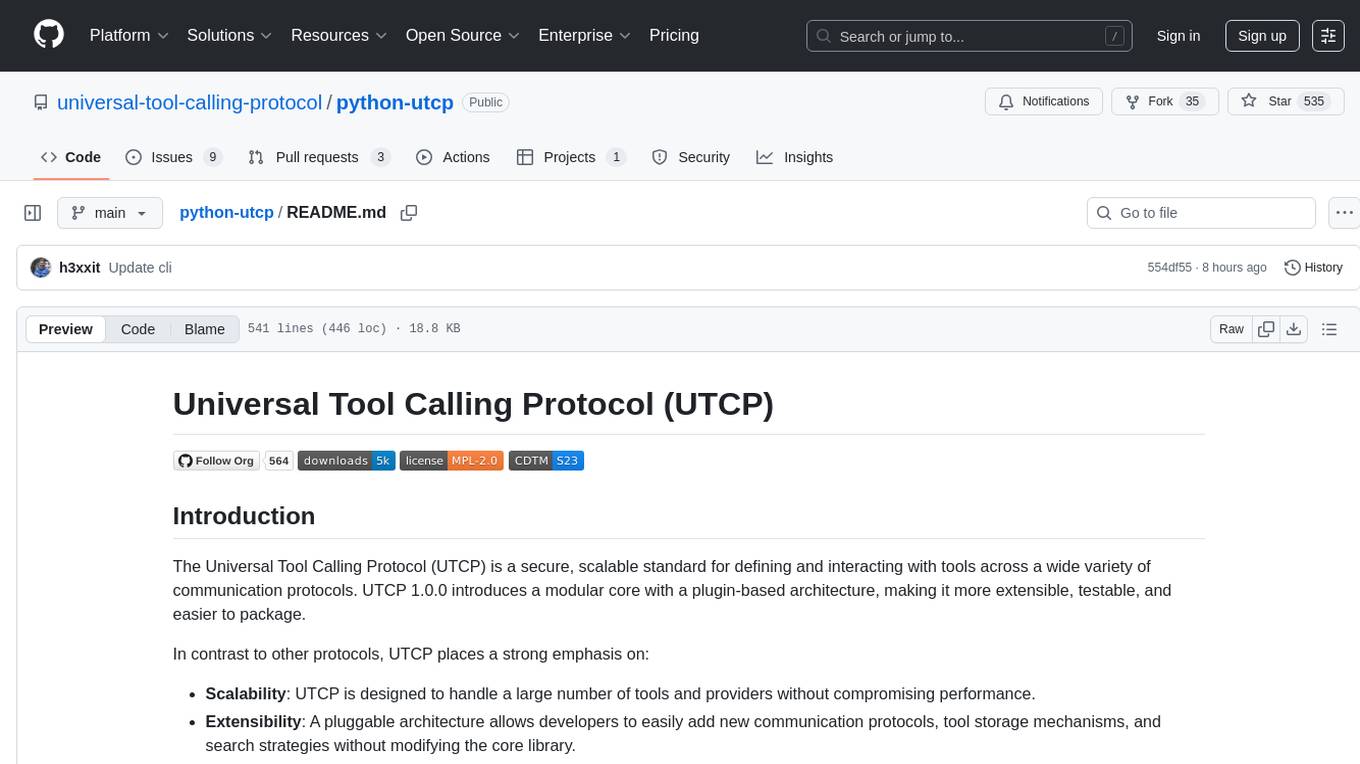
python-utcp
The Universal Tool Calling Protocol (UTCP) is a secure and scalable standard for defining and interacting with tools across various communication protocols. UTCP emphasizes scalability, extensibility, interoperability, and ease of use. It offers a modular core with a plugin-based architecture, making it extensible, testable, and easy to package. The repository contains the complete UTCP Python implementation with core components and protocol-specific plugins for HTTP, CLI, Model Context Protocol, file-based tools, and more.

firecrawl
Firecrawl is an API service that takes a URL, crawls it, and converts it into clean markdown. It crawls all accessible subpages and provides clean markdown for each, without requiring a sitemap. The API is easy to use and can be self-hosted. It also integrates with Langchain and Llama Index. The Python SDK makes it easy to crawl and scrape websites in Python code.
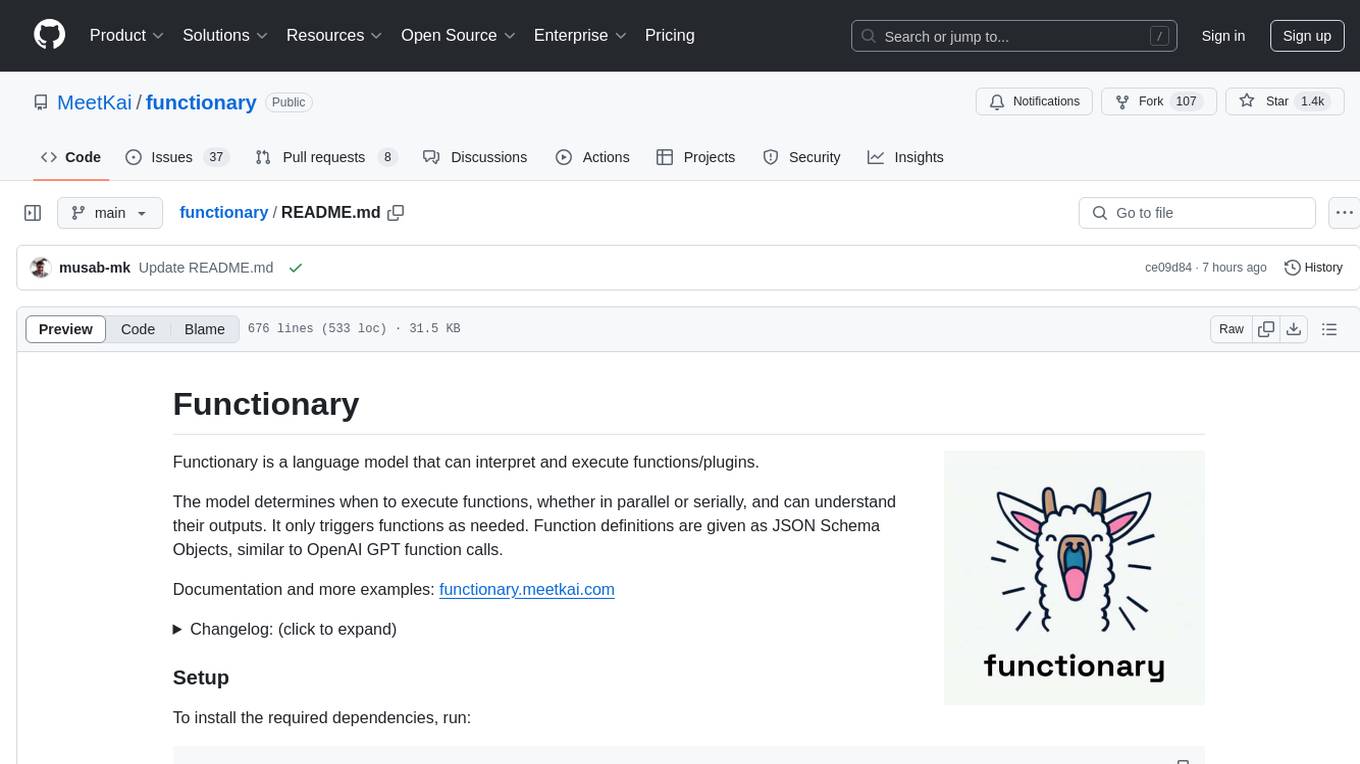
functionary
Functionary is a language model that interprets and executes functions/plugins. It determines when to execute functions, whether in parallel or serially, and understands their outputs. Function definitions are given as JSON Schema Objects, similar to OpenAI GPT function calls. It offers documentation and examples on functionary.meetkai.com. The newest model, meetkai/functionary-medium-v3.1, is ranked 2nd in the Berkeley Function-Calling Leaderboard. Functionary supports models with different context lengths and capabilities for function calling and code interpretation. It also provides grammar sampling for accurate function and parameter names. Users can deploy Functionary models serverlessly using Modal.com.
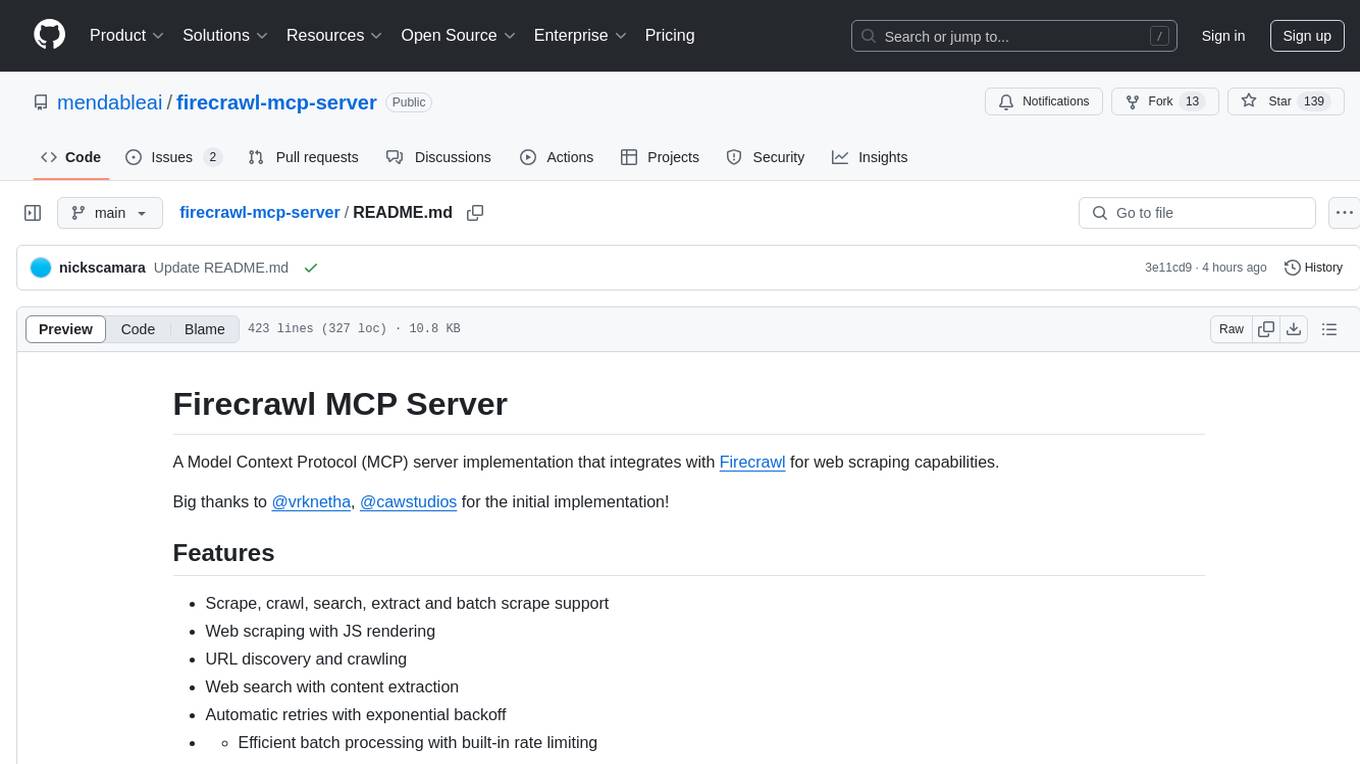
firecrawl-mcp-server
Firecrawl MCP Server is a Model Context Protocol (MCP) server implementation that integrates with Firecrawl for web scraping capabilities. It supports features like scrape, crawl, search, extract, and batch scrape. It provides web scraping with JS rendering, URL discovery, web search with content extraction, automatic retries with exponential backoff, credit usage monitoring, comprehensive logging system, support for cloud and self-hosted FireCrawl instances, mobile/desktop viewport support, and smart content filtering with tag inclusion/exclusion. The server includes configurable parameters for retry behavior and credit usage monitoring, rate limiting and batch processing capabilities, and tools for scraping, batch scraping, checking batch status, searching, crawling, and extracting structured information from web pages.
For similar tasks

LLMStack
LLMStack is a no-code platform for building generative AI agents, workflows, and chatbots. It allows users to connect their own data, internal tools, and GPT-powered models without any coding experience. LLMStack can be deployed to the cloud or on-premise and can be accessed via HTTP API or triggered from Slack or Discord.

ai-guide
This guide is dedicated to Large Language Models (LLMs) that you can run on your home computer. It assumes your PC is a lower-end, non-gaming setup.

onnxruntime-genai
ONNX Runtime Generative AI is a library that provides the generative AI loop for ONNX models, including inference with ONNX Runtime, logits processing, search and sampling, and KV cache management. Users can call a high level `generate()` method, or run each iteration of the model in a loop. It supports greedy/beam search and TopP, TopK sampling to generate token sequences, has built in logits processing like repetition penalties, and allows for easy custom scoring.

jupyter-ai
Jupyter AI connects generative AI with Jupyter notebooks. It provides a user-friendly and powerful way to explore generative AI models in notebooks and improve your productivity in JupyterLab and the Jupyter Notebook. Specifically, Jupyter AI offers: * An `%%ai` magic that turns the Jupyter notebook into a reproducible generative AI playground. This works anywhere the IPython kernel runs (JupyterLab, Jupyter Notebook, Google Colab, Kaggle, VSCode, etc.). * A native chat UI in JupyterLab that enables you to work with generative AI as a conversational assistant. * Support for a wide range of generative model providers, including AI21, Anthropic, AWS, Cohere, Gemini, Hugging Face, NVIDIA, and OpenAI. * Local model support through GPT4All, enabling use of generative AI models on consumer grade machines with ease and privacy.

khoj
Khoj is an open-source, personal AI assistant that extends your capabilities by creating always-available AI agents. You can share your notes and documents to extend your digital brain, and your AI agents have access to the internet, allowing you to incorporate real-time information. Khoj is accessible on Desktop, Emacs, Obsidian, Web, and Whatsapp, and you can share PDF, markdown, org-mode, notion files, and GitHub repositories. You'll get fast, accurate semantic search on top of your docs, and your agents can create deeply personal images and understand your speech. Khoj is self-hostable and always will be.

langchain_dart
LangChain.dart is a Dart port of the popular LangChain Python framework created by Harrison Chase. LangChain provides a set of ready-to-use components for working with language models and a standard interface for chaining them together to formulate more advanced use cases (e.g. chatbots, Q&A with RAG, agents, summarization, extraction, etc.). The components can be grouped into a few core modules: * **Model I/O:** LangChain offers a unified API for interacting with various LLM providers (e.g. OpenAI, Google, Mistral, Ollama, etc.), allowing developers to switch between them with ease. Additionally, it provides tools for managing model inputs (prompt templates and example selectors) and parsing the resulting model outputs (output parsers). * **Retrieval:** assists in loading user data (via document loaders), transforming it (with text splitters), extracting its meaning (using embedding models), storing (in vector stores) and retrieving it (through retrievers) so that it can be used to ground the model's responses (i.e. Retrieval-Augmented Generation or RAG). * **Agents:** "bots" that leverage LLMs to make informed decisions about which available tools (such as web search, calculators, database lookup, etc.) to use to accomplish the designated task. The different components can be composed together using the LangChain Expression Language (LCEL).

danswer
Danswer is an open-source Gen-AI Chat and Unified Search tool that connects to your company's docs, apps, and people. It provides a Chat interface and plugs into any LLM of your choice. Danswer can be deployed anywhere and for any scale - on a laptop, on-premise, or to cloud. Since you own the deployment, your user data and chats are fully in your own control. Danswer is MIT licensed and designed to be modular and easily extensible. The system also comes fully ready for production usage with user authentication, role management (admin/basic users), chat persistence, and a UI for configuring Personas (AI Assistants) and their Prompts. Danswer also serves as a Unified Search across all common workplace tools such as Slack, Google Drive, Confluence, etc. By combining LLMs and team specific knowledge, Danswer becomes a subject matter expert for the team. Imagine ChatGPT if it had access to your team's unique knowledge! It enables questions such as "A customer wants feature X, is this already supported?" or "Where's the pull request for feature Y?"

infinity
Infinity is an AI-native database designed for LLM applications, providing incredibly fast full-text and vector search capabilities. It supports a wide range of data types, including vectors, full-text, and structured data, and offers a fused search feature that combines multiple embeddings and full text. Infinity is easy to use, with an intuitive Python API and a single-binary architecture that simplifies deployment. It achieves high performance, with 0.1 milliseconds query latency on million-scale vector datasets and up to 15K QPS.
For similar jobs

h2ogpt
h2oGPT is an Apache V2 open-source project that allows users to query and summarize documents or chat with local private GPT LLMs. It features a private offline database of any documents (PDFs, Excel, Word, Images, Video Frames, Youtube, Audio, Code, Text, MarkDown, etc.), a persistent database (Chroma, Weaviate, or in-memory FAISS) using accurate embeddings (instructor-large, all-MiniLM-L6-v2, etc.), and efficient use of context using instruct-tuned LLMs (no need for LangChain's few-shot approach). h2oGPT also offers parallel summarization and extraction, reaching an output of 80 tokens per second with the 13B LLaMa2 model, HYDE (Hypothetical Document Embeddings) for enhanced retrieval based upon LLM responses, a variety of models supported (LLaMa2, Mistral, Falcon, Vicuna, WizardLM. With AutoGPTQ, 4-bit/8-bit, LORA, etc.), GPU support from HF and LLaMa.cpp GGML models, and CPU support using HF, LLaMa.cpp, and GPT4ALL models. Additionally, h2oGPT provides Attention Sinks for arbitrarily long generation (LLaMa-2, Mistral, MPT, Pythia, Falcon, etc.), a UI or CLI with streaming of all models, the ability to upload and view documents through the UI (control multiple collaborative or personal collections), Vision Models LLaVa, Claude-3, Gemini-Pro-Vision, GPT-4-Vision, Image Generation Stable Diffusion (sdxl-turbo, sdxl) and PlaygroundAI (playv2), Voice STT using Whisper with streaming audio conversion, Voice TTS using MIT-Licensed Microsoft Speech T5 with multiple voices and Streaming audio conversion, Voice TTS using MPL2-Licensed TTS including Voice Cloning and Streaming audio conversion, AI Assistant Voice Control Mode for hands-free control of h2oGPT chat, Bake-off UI mode against many models at the same time, Easy Download of model artifacts and control over models like LLaMa.cpp through the UI, Authentication in the UI by user/password via Native or Google OAuth, State Preservation in the UI by user/password, Linux, Docker, macOS, and Windows support, Easy Windows Installer for Windows 10 64-bit (CPU/CUDA), Easy macOS Installer for macOS (CPU/M1/M2), Inference Servers support (oLLaMa, HF TGI server, vLLM, Gradio, ExLLaMa, Replicate, OpenAI, Azure OpenAI, Anthropic), OpenAI-compliant, Server Proxy API (h2oGPT acts as drop-in-replacement to OpenAI server), Python client API (to talk to Gradio server), JSON Mode with any model via code block extraction. Also supports MistralAI JSON mode, Claude-3 via function calling with strict Schema, OpenAI via JSON mode, and vLLM via guided_json with strict Schema, Web-Search integration with Chat and Document Q/A, Agents for Search, Document Q/A, Python Code, CSV frames (Experimental, best with OpenAI currently), Evaluate performance using reward models, and Quality maintained with over 1000 unit and integration tests taking over 4 GPU-hours.

mistral.rs
Mistral.rs is a fast LLM inference platform written in Rust. We support inference on a variety of devices, quantization, and easy-to-use application with an Open-AI API compatible HTTP server and Python bindings.
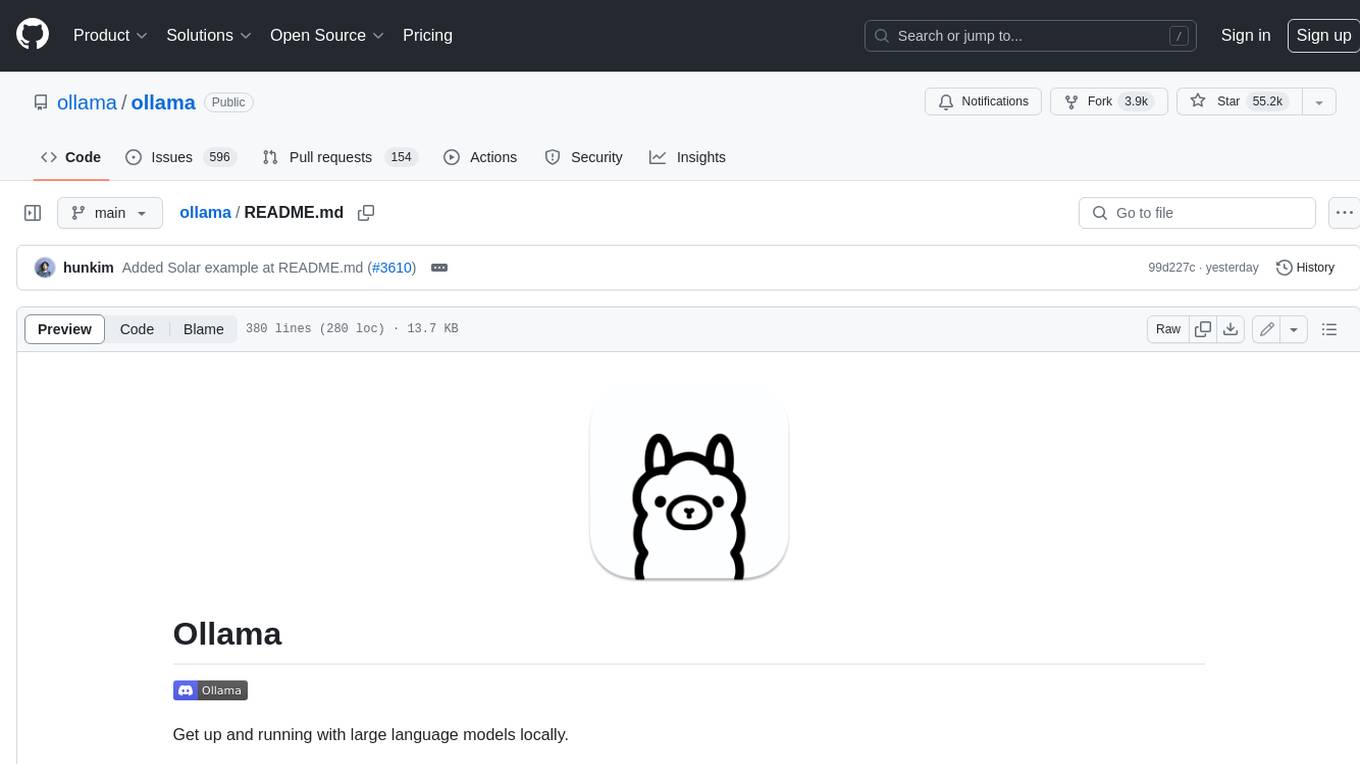
ollama
Ollama is a lightweight, extensible framework for building and running language models on the local machine. It provides a simple API for creating, running, and managing models, as well as a library of pre-built models that can be easily used in a variety of applications. Ollama is designed to be easy to use and accessible to developers of all levels. It is open source and available for free on GitHub.
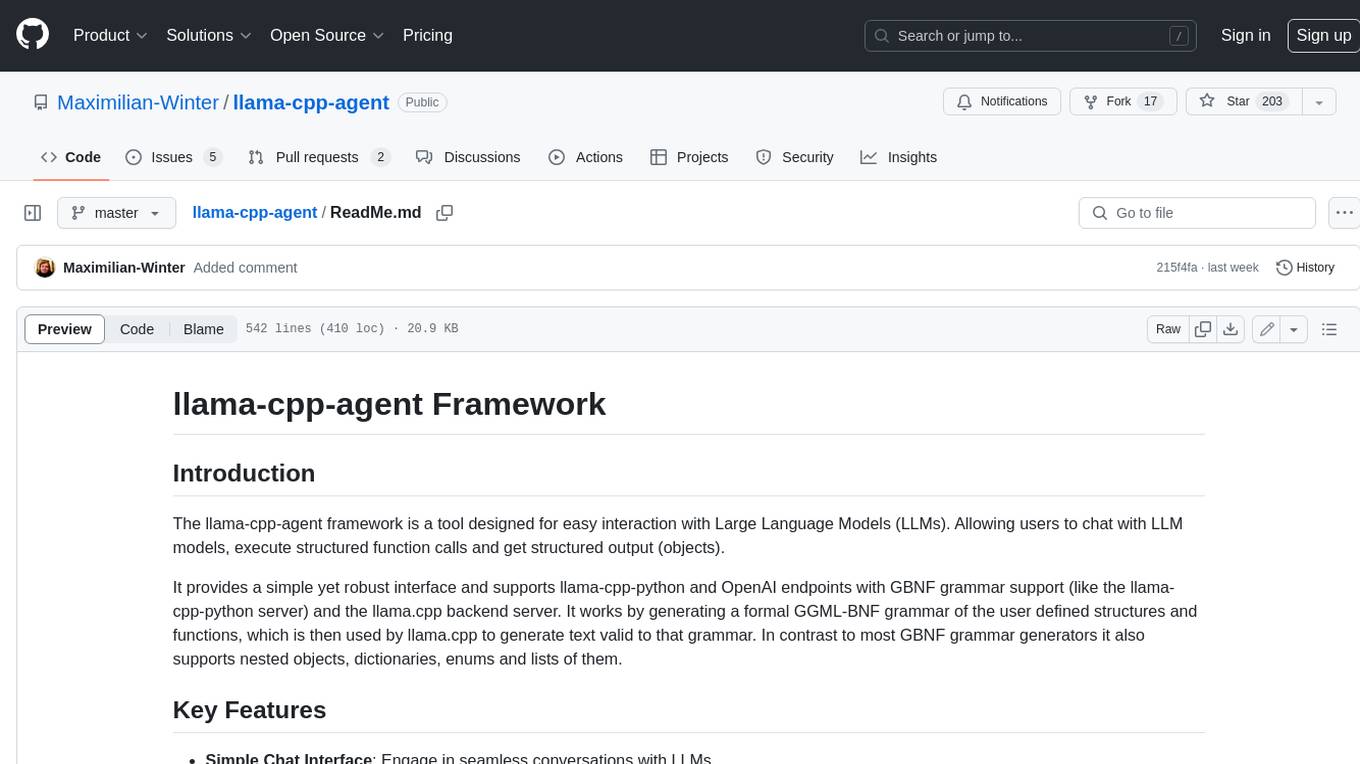
llama-cpp-agent
The llama-cpp-agent framework is a tool designed for easy interaction with Large Language Models (LLMs). Allowing users to chat with LLM models, execute structured function calls and get structured output (objects). It provides a simple yet robust interface and supports llama-cpp-python and OpenAI endpoints with GBNF grammar support (like the llama-cpp-python server) and the llama.cpp backend server. It works by generating a formal GGML-BNF grammar of the user defined structures and functions, which is then used by llama.cpp to generate text valid to that grammar. In contrast to most GBNF grammar generators it also supports nested objects, dictionaries, enums and lists of them.
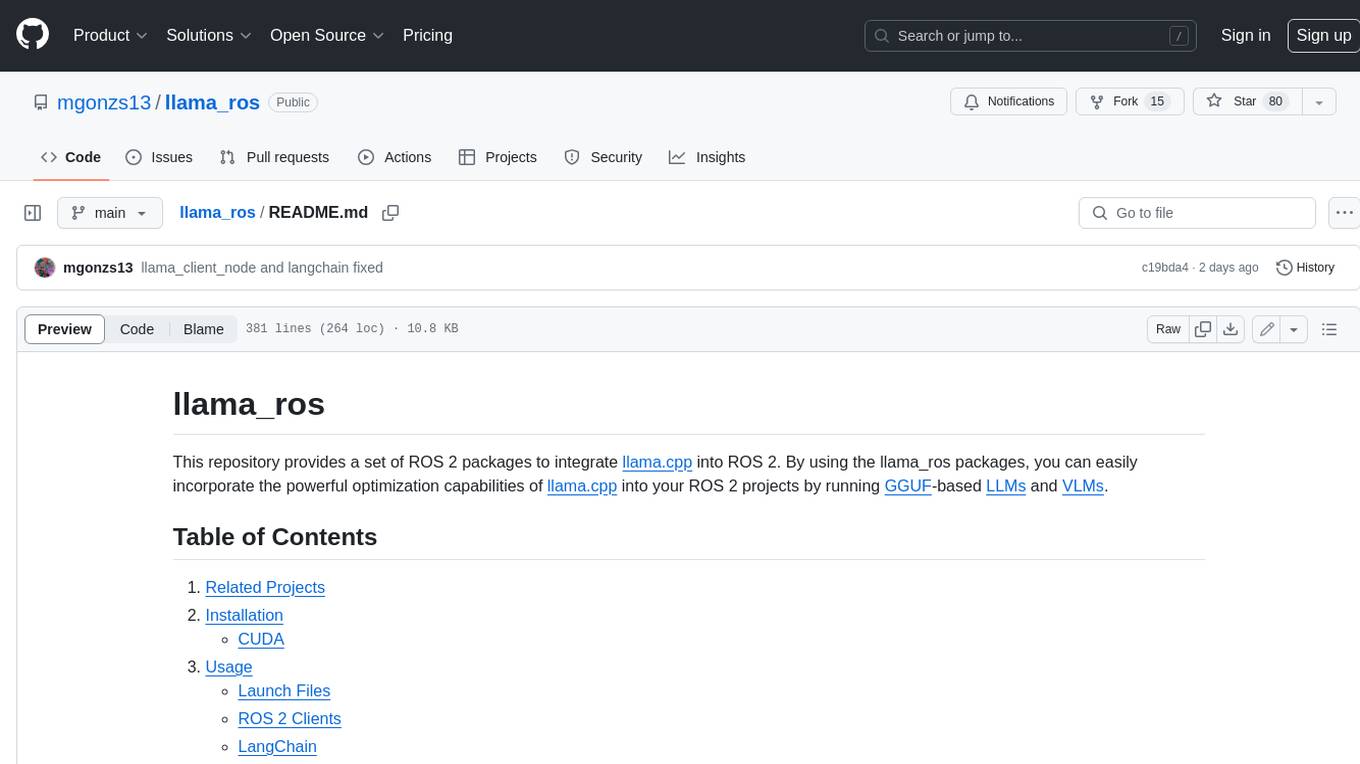
llama_ros
This repository provides a set of ROS 2 packages to integrate llama.cpp into ROS 2. By using the llama_ros packages, you can easily incorporate the powerful optimization capabilities of llama.cpp into your ROS 2 projects by running GGUF-based LLMs and VLMs.
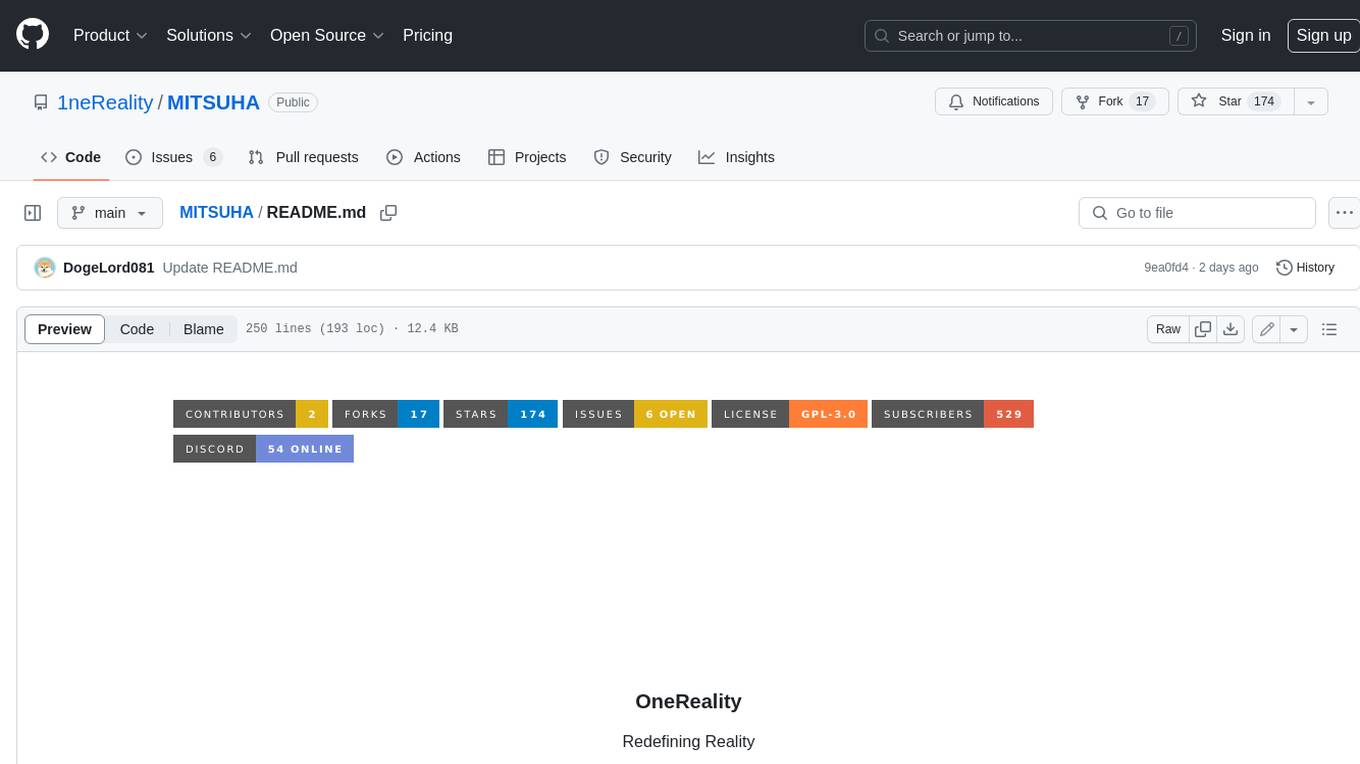
MITSUHA
OneReality is a virtual waifu/assistant that you can speak to through your mic and it'll speak back to you! It has many features such as: * You can speak to her with a mic * It can speak back to you * Has short-term memory and long-term memory * Can open apps * Smarter than you * Fluent in English, Japanese, Korean, and Chinese * Can control your smart home like Alexa if you set up Tuya (more info in Prerequisites) It is built with Python, Llama-cpp-python, Whisper, SpeechRecognition, PocketSphinx, VITS-fast-fine-tuning, VITS-simple-api, HyperDB, Sentence Transformers, and Tuya Cloud IoT.
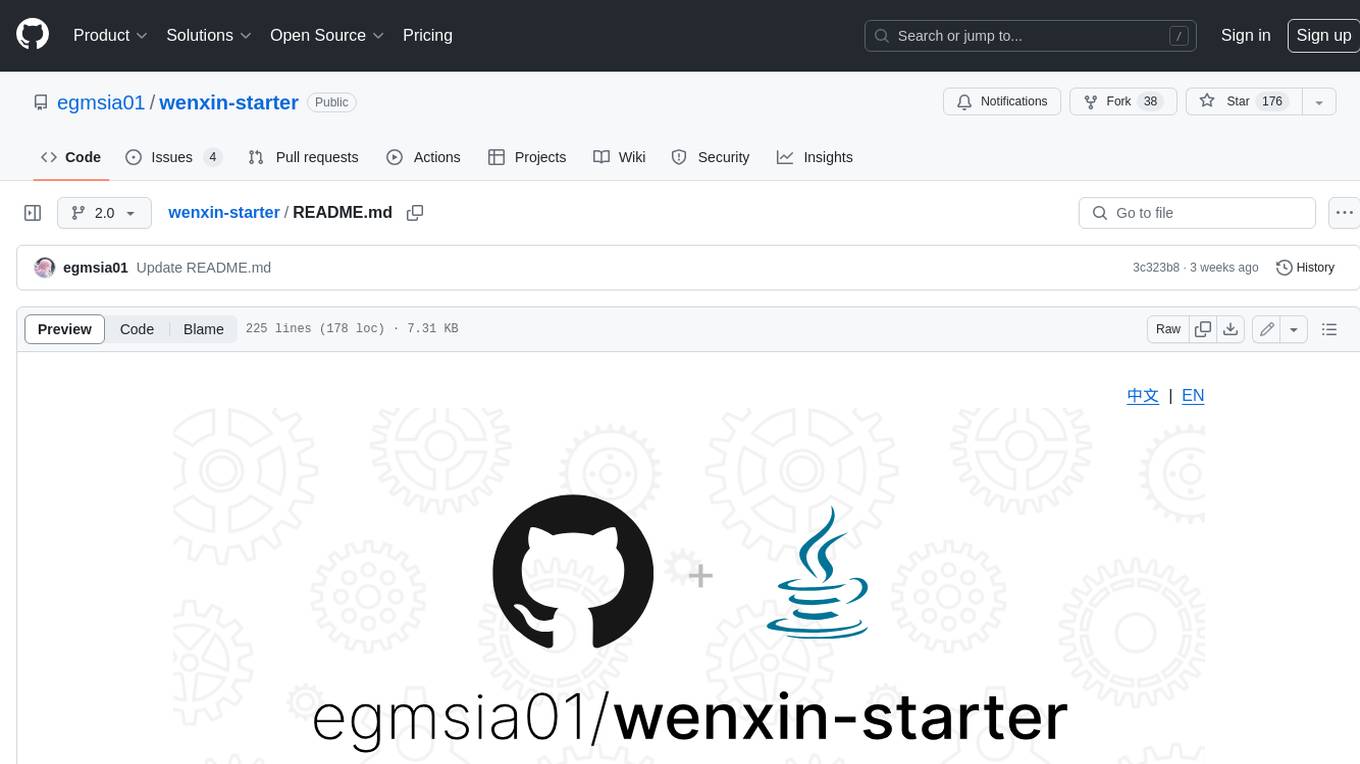
wenxin-starter
WenXin-Starter is a spring-boot-starter for Baidu's "Wenxin Qianfan WENXINWORKSHOP" large model, which can help you quickly access Baidu's AI capabilities. It fully integrates the official API documentation of Wenxin Qianfan. Supports text-to-image generation, built-in dialogue memory, and supports streaming return of dialogue. Supports QPS control of a single model and supports queuing mechanism. Plugins will be added soon.
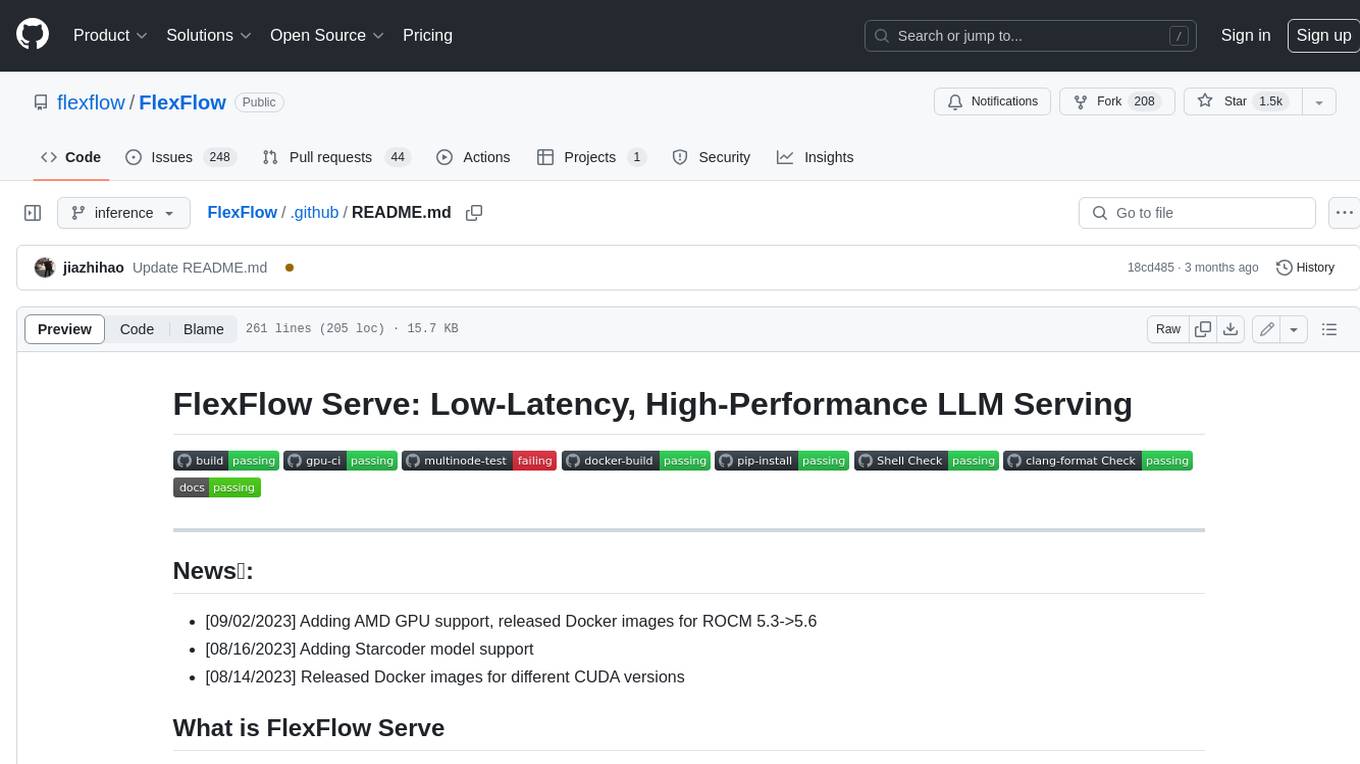
FlexFlow
FlexFlow Serve is an open-source compiler and distributed system for **low latency**, **high performance** LLM serving. FlexFlow Serve outperforms existing systems by 1.3-2.0x for single-node, multi-GPU inference and by 1.4-2.4x for multi-node, multi-GPU inference.